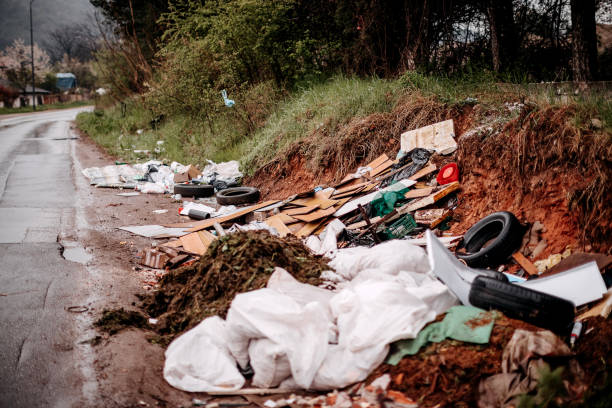The Future of Junk Removal: What to Expect in the Next 5 Years

The junk removal industry is undergoing a significant transformation driven by advancements in technology, environmental awareness, and evolving consumer expectations. Over the next five years, improvements in recycling, expansion of donation partnerships, and the integration of digital booking systems will redefine how waste is managed. These changes will make junk removal more efficient, sustainable, and customer-friendly.
The Rise of Smart Recycling Technologies
As concerns over landfill overuse grow, smart recycling technologies will play a key role in waste management by improving sorting processes, enhancing efficiency, and reducing contamination.
- AI-Powered Waste Sorting: Companies are investing in AI-driven robotic arms that can distinguish between recyclable and non-recyclable materials with greater accuracy. For example, AMP Robotics has developed AI-powered sorting machines that can quickly process waste with minimal human intervention.
- Blockchain for Waste Tracking: Blockchain technology can create a transparent waste tracking system, ensuring that recyclables are properly processed. This will help companies verify whether waste is being recycled responsibly and prevent illegal dumping.
- Advanced Biodegradable Materials: Manufacturers are developing biodegradable plastics and other sustainable materials that break down more efficiently, reducing the burden on landfills.
- Automated Recycling Bins: Smart bins equipped with sensors and AI can help consumers sort recyclables correctly and notify waste management services when they need collection.
Expansion of Donation Partnerships
In an effort to reduce waste, more junk removal companies are forming partnerships with charities and nonprofit organizations to ensure that reusable items are donated rather than discarded.
- Enhanced Donation Networks: Companies like 1-800-GOT-JUNK? and LoadUp are working with organizations such as Goodwill and Habitat for Humanity to donate furniture, electronics, and household goods.
- Tax Incentives for Donations: Governments are encouraging individuals and businesses to donate unwanted items by providing tax deductions for contributions to registered charities.
- Mobile Apps for Easy Donations: Digital platforms are emerging to facilitate donations by allowing users to find local charities and schedule pickups for reusable items.
- Corporate Donation Initiatives: Businesses are implementing sustainability programs that donate excess office furniture and electronics to schools and community centers.
Digital Booking and On-Demand Services
Technology is revolutionizing how customers access junk removal services, making them more convenient and transparent.
- AI-Powered Scheduling: Junk removal companies are adopting AI-powered scheduling systems that optimize pickup routes, reducing costs and wait times.
- On-Demand Junk Removal: Similar to ride-sharing services like Uber, on-demand junk removal apps will allow customers to schedule same-day pickups with real-time tracking.
- Transparent Pricing Models: Platforms will provide instant, upfront pricing estimates based on the volume and type of waste, eliminating hidden fees and improving customer trust.
- Contactless Pickup Options: With the rise of digital payments and safety concerns, companies will offer fully contactless services where customers can leave items outside for scheduled collection.
Increased Government Regulations and Sustainability Initiatives
Governments worldwide are implementing stricter regulations to encourage businesses and individuals to adopt more sustainable waste disposal practices.
- Stronger Recycling Mandates: Many cities and states are enforcing mandatory recycling programs, requiring businesses and households to separate recyclables from general waste.
- Carbon Footprint Reduction Goals: Junk removal companies are investing in electric and hybrid vehicles to cut down on emissions and comply with new sustainability policies.
- Green Certification Programs: Businesses that follow eco-friendly disposal methods can obtain green certifications, making them more appealing to environmentally conscious consumers.
- Extended Producer Responsibility (EPR) Programs: Governments are holding manufacturers responsible for the end-of-life disposal of their products, incentivizing sustainable design and waste reduction strategies.
Strategies for Businesses and Consumers
Both businesses and consumers can take proactive steps to align with these changes and make waste management more sustainable.
- Businesses: Companies should invest in sustainable disposal methods, create employee recycling programs, and partner with certified eco-friendly waste removal services.
- Consumers: Individuals can reduce waste by repurposing old items, donating instead of discarding, and using digital platforms to schedule junk removal with responsible disposal companies.
- Local Governments: Municipalities can implement education campaigns to inform residents about proper waste sorting and incentivize responsible junk disposal.
Conclusion
The junk removal industry is undergoing rapid changes as new technologies, sustainability initiatives, and customer demands drive progress. Over the next five years, AI-powered recycling, expanded donation networks, digital booking systems, and increased government regulations will shape the industry’s future. Companies and consumers who embrace these trends will play a crucial role in making junk removal more efficient, transparent, and environmentally responsible. For more expert insights, visit junkdoor.com.



